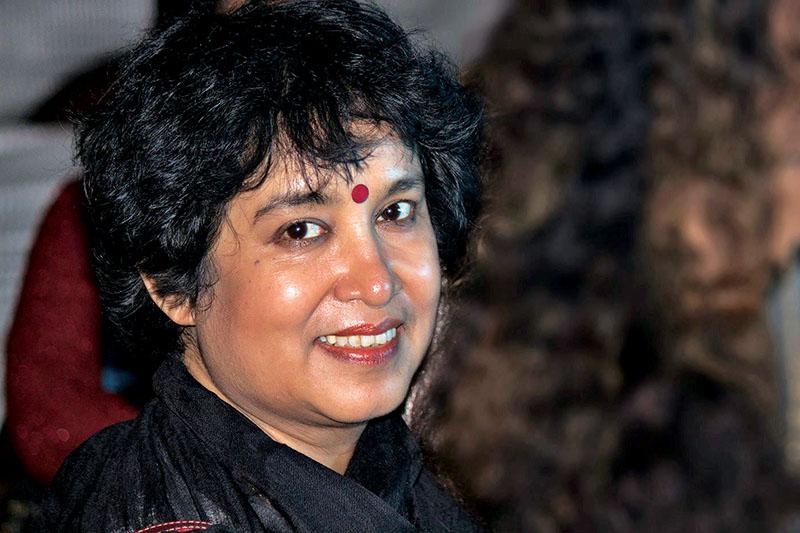Lone rebel activist writer
I sometimes wonder how I became a rebel,” wonders award-winning Bangladeshi writer Taslima Nasreen, who was in Kathmandu recently for a talk programme. Nasreen has written more than 40 books including poetry, essays, novels and autobiography series.
It is all the more of a wonder as she describes herself as “a very shy girl who used to read books. I didn’t go out. I didn’t have many friends. I was busy all the time reading books. I wasn’t very outspoken”.
Nasreen is known for her strong and hard-hitting writing on women’s oppression and criticism of religion and patriarchal society. As a result multiple fatwas calling for her death were issued, while her books were banned in Bangladesh, ultimately resulting in her exile.
“When I look back, when I see that I did a lot of things, I cannot imagine I have actually done or could do so many things,” this 54-year-old writer divulges adding, “Some things I did for the first time. I rented an apartment in 90s to live alone — that was for the first time in Bangladesh that a woman was living alone. I started it and I feel proud of it. I broke a lot of taboos — I didn’t wear dupatta as a teenager surprising the boys on streets. I fell in love and I decided to marry, which was not arranged. Then I realised that the man was not right, so I divorced. I started to live alone in my late 20s.”
Nasreen started writing and publishing poems when she was 13 inspired by her brothers who “used to write, edit and publish poems in literary magazines which we used to call Little Magazine in late 70s”. She later published poetry books like Shikore Bipul Khudha (Hunger in the Roots) and Nirbashito Bahire Ontore (Banished Without and Within) in the 80’s followed by many other poetry books, essay collections, novels, short stories and autobiographies and their translations.
“Women are oppressed. They don’t have equal rights, they are not treated as humans; they don’t have freedom. I have seen that in my society; I was harassed because I was a girl,” she says of why she writes about women. And also “because I have seen how women suffer because of religious law and system. Religion is patriarchal. Women are not considered equal humans under the religious system”.
Nasreen firmly believes that women should have the rightsto continue their education and get financial independence, very important for women’s right.
Unlike many girls in her society, Nasreen grew up in “secular environment” where her father encouraged her for education. And she is thankful to her father who made her to study medicine which she loved. “I am really grateful to my father as science helped me a lot because I am free of superstitions and all kinds of religious beliefs — science made me a rational person,” she explains describing herself as “never a religious but curious child”.
For woman to be equal, it should start at home. “Women will never get equal rights outside home if they don’t have it at home. They have to get equal rights everywhere and be respected as equal beings, rather than be respected as a weaker being like ‘let her go first’ or ‘give her seat’,” she opines.
She has written voraciously against the system and for change, but she does not call herself an activist. When she became a renowned feminist writer in Bangladesh, many women’s organisations asked her to join them, but she didn’t.
“I don’t care about the government and big people. I don’t care what happens to me. If someone is in an organisation, they become limited. They have to please the government, they cannot also be so angry against fanatics,” she points out. “If I write alone, I don’t have to care about anything. If I am involved, then those leaders will always ask me not to write this and not to write that. So, I want to be free when I write. I believe in free thought. And I work alone.”
Her strength
“Writing is life for me. I cannot imagine living life without writing. It gives me so much strength,” she shares. And she believes her work is a prescription for society.
Many women go to her or buy her books — “that made me realise women are reading my books”.
“I get feedback from women. They say that they were forced to stop their education, and now are continuing with their studies; they were housewives, they have struggled and now have a job; they were abused by their husbands, now they are divorced — all these they say they did because they got strength after reading my book. This gives me idea that people are changing,” she says.
Her famous books include novel Lajja (1993) and biographies Amar Meyebela (My Girlhood) and Ka (Speak Up).
When she was in Nepal, many girls and women went to her to “take photographs. Before they used to come for autographs, now come they come for photographs. Time has changed”.
Nasreen, who is working on a new novel, expresses, “I didn’t know I was so popular in Nepal. So I love that. So many girls and women, and also men, said that they read my books even though I don’t know who published my books in Nepali,” she says adding, “They never got my permission for translation and they never gave me the royalty. But it is okay if the translation is good. I don’t know from where they translated, from Bengali or Hindi. But if the translation is good, I have no problems if they don’t pay me royalty. At least the readers can read what I wrote.”


